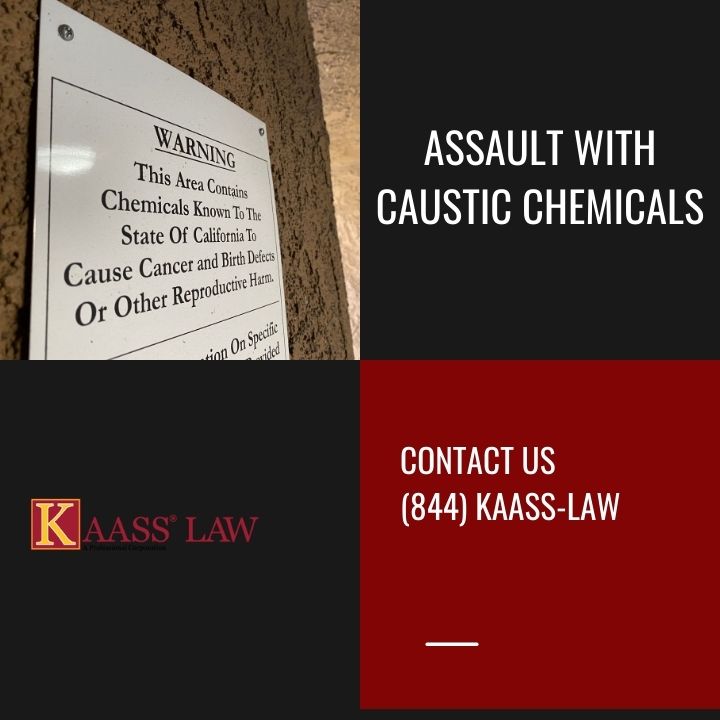One of the different varieties of an assault- defined under California law as an attempt by a person to cause significant injury to the victim, is assault with caustic chemicals. Particularly, the assault entails throwing, placing, and causing the placement of special chemicals. Specifically, “caustic chemicals, corrosive substances, flammable substances, vitriol” on the victim with a particular intent to injure, to cause harm, to disfigure the victim.
The Instrument of the Crime
As the description of the crime shows, instruments are caustic chemicals, flammable substances, corrosive substances, vitriol, etc.
Let’s examine the types of chemicals.
The characteristics of caustic chemicals are the ability to burn and corrode a living tissue of the victim (skin, eyes, nose, mouth, etc). Examples of such caustic chemicals are hydrochloric acid, sulfuric acid, etc. Vitriol is the name that identifies sulfuric acid and its constituents.
Flashpoint is the lowest temperature at which a liquid’s vapor can ignite. Section 244 also applies to flammable substances that have a flashpoint of 150 degrees or less Fahrenheit.
Willful or Malicious Act
To obtain a conviction, the prosecutor must be able to prove all of the elements of the crime listed in CALCRIM 877 Jury Instructions beyond a reasonable doubt.
- By throwing, or causing to be thrown, you acted willfully and maliciously
- On someone, a caustic chemical, corrosive substance, or flammable substance
- With the intent of injuring their flesh or deforming their appearance
- You weren’t acting in self-defense or in the best interests of others
- In practice, this means that not every incident in which caustic chemicals are thrown or placed on another person is illegal
An accidental application of chemicals, even if it outcomes in serious injuries, is not a violation of Section 244, as you might expect.
More unusual circumstances, such as the intentional use of a qualifying chemical for a legitimate purpose like medical treatment, would not qualify. The defendant must act with the intent to cause harm to the victim.
Intent
Intent to cause harm by use of caustic chemicals is another mandatory element to criminalize actions under section 244 of the California Penal Code. Let’s examine the following situation. A robber attacks me in the building. I grab a bottle full of liquid from the floor and pours it onto the robber’s face. I had the intent to distract the robber and ran away. However, the bottle contained an acid, which burned the eyes of the robber. In this case, we can say that the act was done on purpose—though not willingly. There was no intention of using the chemical acid to disfigure or injure the robber. Section 244 of the California Penal Code does not make the act illegal.
In another example, a girl is very jealous of her pretty neighbor who everyday wears a new and expensive dress. One day she argues with her and pours a chemical on her, screaming that she does not deserve that luxurious life. In this case, it is obvious that there has been an intent to cause harm to the victim and a willful act expressed by pouring the chemical.
Penalties for violations of section 244 of the Penal Code
Assault with caustic chemicals is a felony offense. Penalties for the actions are imprisonment in state prison for two, three, or four years or a fine in the amount of up to 10.000$.
A judge can also sentence the defendant to felony probation.
Probation may usually include imprisonment in the state prison for not more than 1 year. As well as other negative legal consequences for the defendant. The latter must pay a fine to the victims as well as face other restrictions. Paying restitution to the victim, meeting with the probation officer on a regular basis, and staying away from and not harassing the victim are all requirements.
Glendale Personal Injury Lawyer
If you or a loved one has been harmed as the result of another’s negligence, then you may be entitled to compensation. If that is the case, contact our Glendale personal injury lawyer today for a consultation and case review. Please feel free to give our office a call at 310.943.1171.

